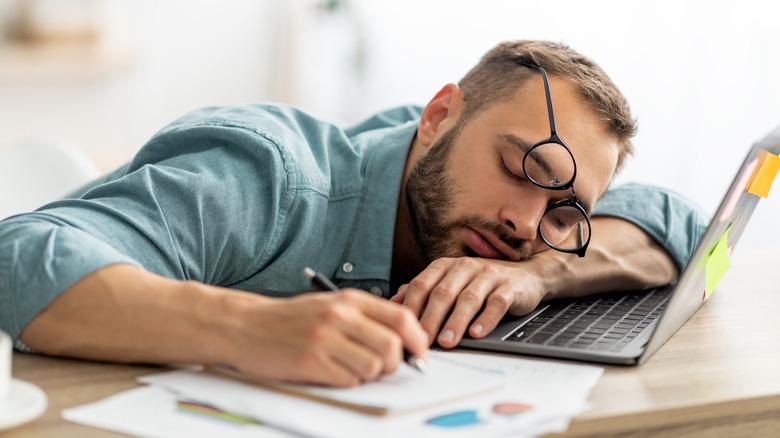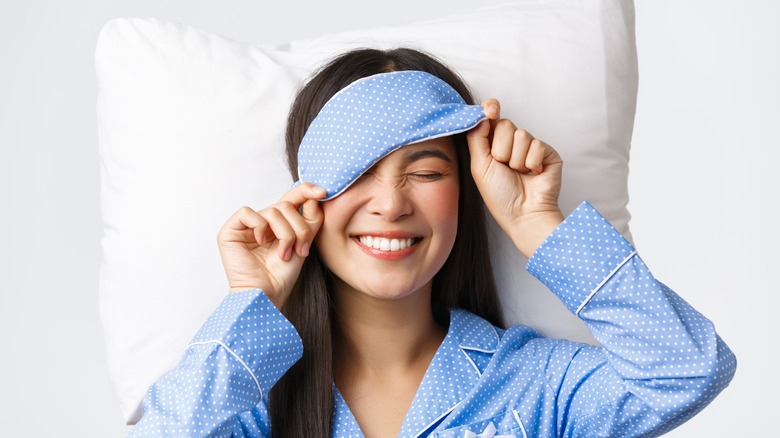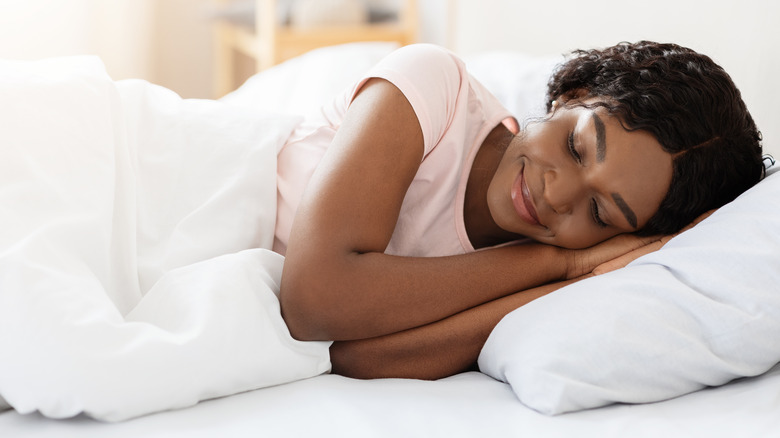Here's What You Should Do When You Didn't Get Enough Sleep Last Night
Waking up and realizing you didn't get enough sleep is not a good feeling. While nothing is going to bring back that time you lost, there are a few things you can do to help yourself feel better as quickly as possible. First, as tempting as it may be to press snooze, try not to sleep in too late. Sleeping in for more than an hour than normal can mess with your circadian rhythms and make it harder to fall asleep on future nights (via Self).
As soon as you can, try to get some sunlight by going outside for a walk or just sitting by a sunny window. Sunlight exposure helps to regulate your circadian rhythms. And while you're at it, try and take a nap if you can. Napping for 20 to 30 minutes can help improve your alertness and cognitive function. Finally, go to bed earlier the next night if you can. One bad night of sleep won't ruin your sleep schedule, but if you make a habit of not getting enough sleep, it will. So do your best to get back on track as soon as possible. Your future self will thank you.
How to set yourself up for a good night's sleep
Getting a good night's sleep is essential for overall health and well-being. It's during sleep that our bodies repair damage done during the day, and it's also when we process new information and learn new things. A lack of sleep can lead to all sorts of problems, both physically and mentally. According to The University of Texas MD Anderson Cancer Center, one of the best things you can do for your sleep is to establish a regular sleep schedule. That means going to bed and waking up at the same time each day, even on weekends and holidays. This may be difficult at first, but it will pay off in the long run. Your body will get used to the new routine and it will be easier to fall asleep and stay asleep.
A relaxing bedtime routine can help signal to your body that it's time to sleep. This might include taking a warm bath, reading a book, or writing in a journal. Whatever you choose, make sure it's something that relaxes you and that you can do consistently each night. Caffeine and alcohol are both stimulants, so they can make it harder to fall asleep and stay asleep. If you need to drink something before bed, try herbal tea or water instead. And if you're craving a late-night snack, reach for something high in protein like nuts or cheese, which will help promote sleep.
Other healthy sleep habits
The environment in your bedroom can have a big impact on your sleep (via The Centers for Disease Control and Prevention). Make sure the room is dark, quiet, and cool enough for sleeping. If you live in a noisy area or have trouble sleeping in silence, try using a white noise machine to help you drift off. According to Johns Hopkins Medicine, exercise is a great way to improve your sleep. Just make sure you don't do it too close to bedtime, as the endorphins released during exercise can actually keep you awake. A good time to exercise is in the early evening, several hours before you go to bed.
The blue light emitted by screens can disrupt your circadian rhythm and make it harder to fall asleep (via The American Academy of Sleep Medicine). So limit your screen time in the hours leading up to bedtime, and if you must use a device before turning in, try using an app that filters out blue light. If you've tried all of these tips and you're still struggling to sleep, it's time to see your doctor. There could be an underlying medical condition causing your insomnia, and a professional can help you find the right treatment. With some persistence and effort, you can get on track for better sleep and better health.



